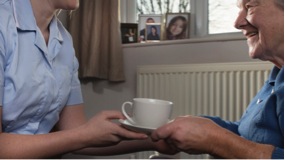Focus Care On The Needs Of The Resident, Says NICE
 NICE has published a new briefing to help local authorities and partner organisations ensure that older people in care homes receive the best possible care.
NICE has published a new briefing to help local authorities and partner organisations ensure that older people in care homes receive the best possible care.
There are more than 450,000 people living in the 12,800 registered residential care homes and 4,600 registered nursing care homes in England.
Although local authorities run fewer than 1,000 residential care homes, they have a duty of care for all residents. They oversee safeguarding issues and promote residents’ wellbeing.
A recent report by healthcare analysts LaingBuisson, which looked at almost 10,000 care homes in England, found that one in five care homes failed to meet national standards for safety and care.
The Care Quality Commission (CQC) introduced a new inspection regime for care home in October 2014 following ongoing concerns that patients were being mistreated, and has recently issued guidance on the use of hidden cameras to monitor care home residents.
This latest local government briefing summarises NICE’s key guidance and quality standard recommendations for local authorities on the health and care of older people in care homes, as well highlighting other sources of information.
The recommendations and quality statements signposted in the briefing include:
• ensure older people in care homes retain their independence and identity
• set clear policies and plans for older people in care homes
• provide equal access to services
• ensure residents are safe
• prevent infections among residents.
Professor Gillian Leng, Deputy Chief Executive at NICE, said: “Older people often move to a care home as a result of a crisis, with no preparation and little or no planning. This briefing underlines the importance of focusing care on the needs of the resident. It aims to help local authorities make well-informed, evidence-based decisions on issues affecting the care provided for older people.
“NICE recommendations advise that people living in care homes should be helped to retain their independence and identity, for example through supporting them to take part in activities they enjoy, and allowing them to go at their own pace. It’s also important to respect a person’s right to make their own decisions if they still have the capacity to do so. This includes having as much choice as possible about personal routines such as when someone eats or sleeps, or spends time alone. The person’s needs should come before what is most convenient for the home.
“Older people’s physical needs are equally important to their mental wellbeing. The briefing also highlights recommendations on preventing falls, supporting people with dementia, procedures for reporting safeguarding and handling medicines errors, and quality statements on screening for malnutrition. Following the steps set out in the briefing will help local authorities and their partner organisations to deliver good standards of care for older people in care homes. The briefing may also help families and people moving into homes to ask questions about the care being provided.”




